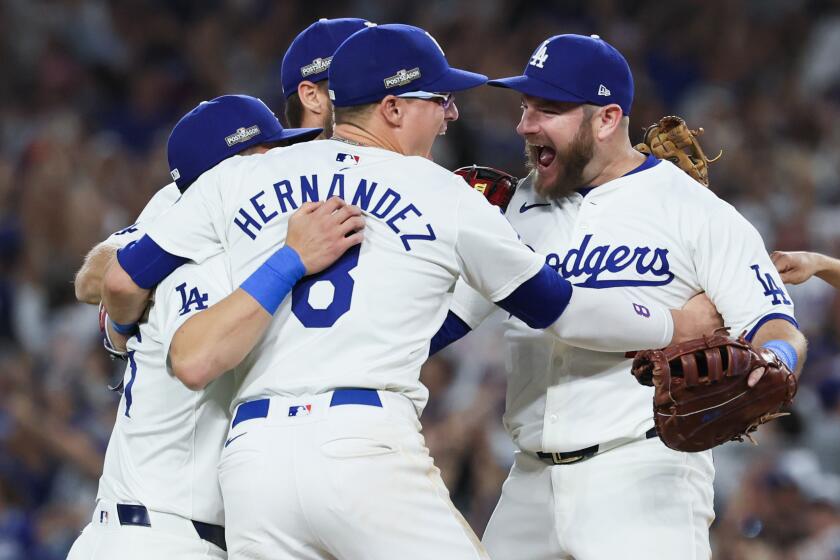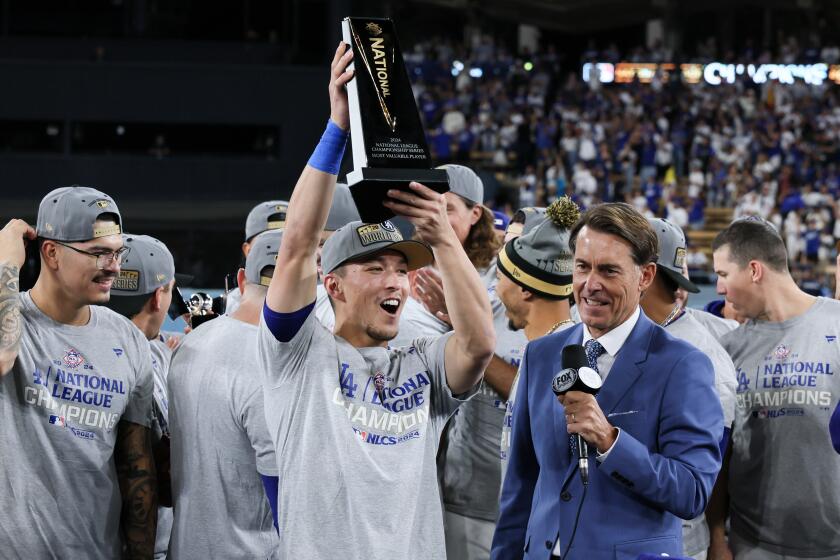Bugging THE Opposition : Brett Butler Will Do His Stuff for Dodgers: Get On, Steal Bases and Generally Annoy
VERO BEACH, Fla. — Brett Butler still remembers the shouts, the jeers, the fear of humiliation that can grow large in a small boy.
“Every day, for two years, the other kids in junior high would chase me around the playground and try to pull my underwear up above my pants,” Butler said recently. “I would run, and run, and finally just run home. Every day.”
Butler still remembers the harsh sounds of laughter coming from his high school baseball coach when Butler told him he wanted to play baseball at Arizona State.
“Yeah, it sounded like a laugh,” Butler said. “Then he said something to the effect of, ‘How do you expect to play in college when you can’t even play for me?’ ”
Butler still remembers the humiliating look of surprise on the face of an Arizona State assistant coach when Butler asked him for a scholarship after a standout freshman season.
“He just looked at me and said, ‘I can’t help you,’ ” Butler said. “Just like that. I can’t help you .”
And Butler vividly remembers how, 15 years later, people were still telling him no.
He remembers the cold phone call this winter from Al Rosen, the San Francisco Giants’ general manager, who informed him that he would not be offered a new contract.
The Giants thought Butler wanted too much money. Butler said it was a misunderstanding.
“I was hurt, that’s the best way to describe it,” said Butler, who signed with the Dodgers after three productive seasons with the Giants. “I was just hurt.”
Brett Butler remembers every insult, every slight, every person who ever told him that he was not big enough to reach the dream he once wrote about in a sixth-grade essay. He saves the memories like other people save newspaper clippings.
Then every summer, he pulls them out and uses them as his inspiration to get even.
“It was always, ‘You can’t do this, you’ll never do that,’ ” said Butler, the Dodgers’ new center fielder and leadoff hitter. “I always took all of the abuse. I was always the smallest.”
It has taken 33 years, but in some ways, he enters the 1991 baseball season as one of the biggest.
He is one of the biggest Dodgers, being described by Manager Tom Lasorda as “the final piece to our puzzle,” after signing a three-year, $10-million deal last winter after leaving the Giants as a free agent.
He is also one of baseball’s biggest pains.
Because of Butler’s style of play, which includes bunts, infield singles, stolen bases and diving catches, fewer players intentionally cause more frustration.
“He’s not just the little guy who wants to knock the chip off the shoulder of the big guy,” said former Giant pitcher Mike Krukow, who played with Butler for two seasons. “He is the little guy who wants to sneak up behind the big guy and knock off that chip.
“He’s a damn gnat.”
Butler said he prefers comparisons with a different insect.
“I think the best description of me has been when somebody said, ‘You’re a little cockroach,’ ” Butler said. “Because a cockroach is always there when you don’t want him to be there.”
But Butler hardly looks nasty. He is 5 feet 9, 156 pounds. He wears size-7 shoes, the smallest in baseball. Heck, he even wears braces.
“Fine, don’t take me seriously,” Butler said, smiling. “That’s the way I like it.”
But if Butler think he fools anybody anymore, he is fooling himself.
“I’m glad he’s here, because I couldn’t stand to pitch to him,” said Dodger pitcher Kevin Gross, who faced Butler while with the Philadelphia Phillies and the Montreal Expos. “He is a small target, but he bats like a big man. Once you get ahead of him, he’ll stand there and foul off balls all day. If you can’t get him early in the count, it’s like you can’t get him.
“He would make me so mad out there . . . “
Chris Gwynn said it was worse playing in the outfield against him, noting: “If you move into the gap, he hits it down the line. If you move down the line, he hits it in the gap. And then when you don’t expect it, he bunts!”
And he keeps getting better at everything.
Last season, he had a career-high 192 hits, tying Lenny Dykstra of the Phillies for the National League lead. His 51 stolen bases was his highest total since 1984 and his 73% success rate was the highest of his career.
He led the league with 160 singles, 288 times on base, and 2,902 pitches seen. The latter category, while obscure, indicates what may be his top contribution to the Dodger lineup.
“Brett will do great in that batting order because he is a leadoff guy who regularly forces the pitcher to throw 10 or 12 pitches,” Krukow said. “Considering the average pitcher’s effectiveness limit is 25 pitches per inning, after battling Butler they may not have enough left for the third and fourth hitters.
“Many people are convinced that is one reason Kevin Mitchell and Will Clark did so well batting behind Butler. By the time the pitcher got to them, he was wearing down.”
Butler wears people down not only with his style of play, but also with his style of speech. He says what he thinks, which sometimes irks players and fans.
“Like it says in the Bible, my ‘yes’ is a yes and my ‘no’ is a no,” said Butler, a Christian. “I give it straight.”
One prominent example of how his mouth can get him into trouble occurred last season, during a losing streak with the Giants.
After one game, he said, “God must be bringing us together to fight a battle. But you know, Satan attacks everybody.”
The next day, San Francisco newspapers accused him of blaming Satan for the losing streak. Soon it was the joke of the league.
“It was a misunderstanding, I never blamed anything on Satan,” Butler said. “But I sure heard about it. A few days later, we were in New York, and people in the stands are shouting, ‘Butler, Satan, 6-6-6.’ ”
Another example occurred during the winter when, moments after leaving his friends on the Giants for the rival Dodgers, Butler said: “It has always been my dream to play for the Dodgers.”
“That was bull,” said Krukow, who will work part time as a Giant announcer this year. “You do not walk out of a Giants uniform and immediately say you have dreamed of playing for the Dodgers. I’m mad about it, and I don’t even play there anymore.
“If I was still pitching, I would dust him off as soon as I saw him. And I know I’m not the only person who thinks this.”
“Sorry,” Butler said, “but I have bought into the Dodger organization hook, line and sinker.”
Yet another example occurred this spring in Kissimmee, Fla., when Butler lectured a group of fans who were crowding a railing above the dugout for his autograph.
“Look at this little boy, somebody is going to crush him!” Butler shouted to the people. “Some of you are just being selfish. You have to think of other people, you have to be more considerate . . . “
In the clubhouse, Butler has already made his mark by holding discussions on hitting with Juan Samuel, who will bat behind him. And on the field, watch how many times his head turns from left to right.
“Butler is always talking out there, always shouting strategy to us,” Darryl Strawberry said.
“I give you what I got,” Butler said. “That includes everything.”
There is a touch of harmless cockiness in Butler’s voice, but only because it was forced into him while growing up.
In the seventh grade, his family moved from Fremont, Calif., to Libertyville, Ill., about an hour north of Chicago. Being so small and out of place--he was even shorter than his brother and sister--he needed a way to get noticed.
“He was this outgoing, gregarious kid from California who ran around wearing white socks, which were different from anybody else,” said Aidia Kozica, a boyhood friend who is now a dentist in Worcester, Mass. “He always tried extra hard to prove himself to everybody. But it didn’t always work.”
Butler’s classmates made fun of his socks. They chased him in search of his underwear.
In the eighth grade, one classmate was so upset at Butler’s perceived arrogance that he strolled up to Butler in the locker room and slugged him in the stomach.
“Sure, I would go up to our coaches and say, ‘Look, I’m better than that guy, let me play,’ ” Butler said. “That’s what I had to do to get them to look at me.”
This attitude led to a clash between him and his high school baseball coach, which led to Butler sitting on the bench for much of his final two seasons.
“The coach’s favorite player was the catcher, whose brother was an outfielder who played my position,” Butler said. “I would tell the coach, ‘Give me a chance to play, and I will prove I am better than that guy.’ He didn’t like it because it upset the kid’s brother. So I sat on the bench.”
Bob Harju, another boyhood friend, said many people sided with the coach.
“They would say, ‘Yeah, Butler, what a jerk, what a fool,’ ” Harju said. “They thought he was arrogant and cocky. But I admired his confidence. He didn’t care what people said or thought about him.”
Butler was so confident, after graduation he enrolled at baseball powerhouse Arizona State despite the laughs of his coach. And despite the presence of about 250 walk-on players, he made the junior varsity and led it in hitting as a freshman.
But once again, he felt unwanted.
“It was so hard for him that summer after he was turned down for the scholarship,” Harju said. “We would kick my brother out of my bedroom and sit up all night talking. Brett would say, ‘I want to play pro ball so bad. . . . I cannot live without playing.’ ”
After playing well in a summer semipro league, he received an offer from tiny Southeastern Oklahoma State University. He transferred and was eventually a two-time All-American there.
And it still wasn’t enough to earn him respect, as he was taken by the Atlanta Braves in the 23rd round of the June 1979 draft.
“The Braves’ scout recommended me, more or less, as a favor to my college coach,” Butler said. “Then when the scout walked into my house and I asked for a $5,000 bonus, he turned to walk out. I grabbed him before he could leave and signed for $1,000.”
Thirteen years later, Butler makes more than $1,000 per swing--not that the money has affected him.
He married a woman he met in the minor leagues, and they live with their three daughters and one son in a sprawling house near Atlanta, the size of which sometimes embarrasses him.
“I remember driving into his neighborhood with him,” Harju said, “and he’s going, ‘Look at these homes! How do people afford these homes?’ Then he pulls into a driveway of one of those homes, and it’s his!”
Friends say Butler gives 10% of his money to his church and frequently gives money to people who send him requests. On one recent afternoon in the clubhouse, he was poring over two letters from Africa.
“What is $10 million. . . . I mean, what does it mean?” Butler asked. “I have no idea what it is, or how I should spend it. I just know the more I give, the more I seem to receive.”
He has certainly continued to give on the baseball field, as his Dodger teammates have seen.
There is a reason he has had 20 or more bunt hits for seven consecutive years. He practiced bunting for an hour before every Dodger workout this spring.
There is a reason he was the third toughest batter in the league to induce into a double play last season, hitting into one every 207.3 at-bats. He studies videotapes of pitchers, infielders and himself. He knows where to place the ball.
But you don’t have to believe the statistics, you can just watch Butler this season. Particularly against the San Francisco Giants. With some people, he still feels a need to get even.
“I am really pulling for Willie McGee (his replacement in center field), because it would not be fair to him if things go bad,” Butler said. “But every year, I have a couple of teams where I try extra hard when we play them. I mean, like, extra, extra hard. This year, the Giants are one of those teams.”
Butler flashed the smile of a boy who has long since outraced the schoolyard bullies, a boy who now has the ability to be a bully himself.
“Just watch me,” he said. “Just watch me.”
CAREER STATISTICS
Year Team Avg. R H BB SB 1981 Atlanta .254 17 32 19 9 1982 Atlanta .217 35 52 25 21 1983 Atlanta .281 84 154 54 39 1984 Cleveland .269 108 162 86 52 1985 Cleveland .311 106 184 63 47 1986 Cleveland .278 92 163 70 32 1987 Cleveland .295 91 154 91 33 1988 San Francisco .287 109 163 97 43 1989 San Francisco .283 100 168 59 31 1990 San Francisco .309 108 192 90 51 Career totals .285 850 1,424 654 358
More to Read
Are you a true-blue fan?
Get our Dodgers Dugout newsletter for insights, news and much more.
You may occasionally receive promotional content from the Los Angeles Times.











